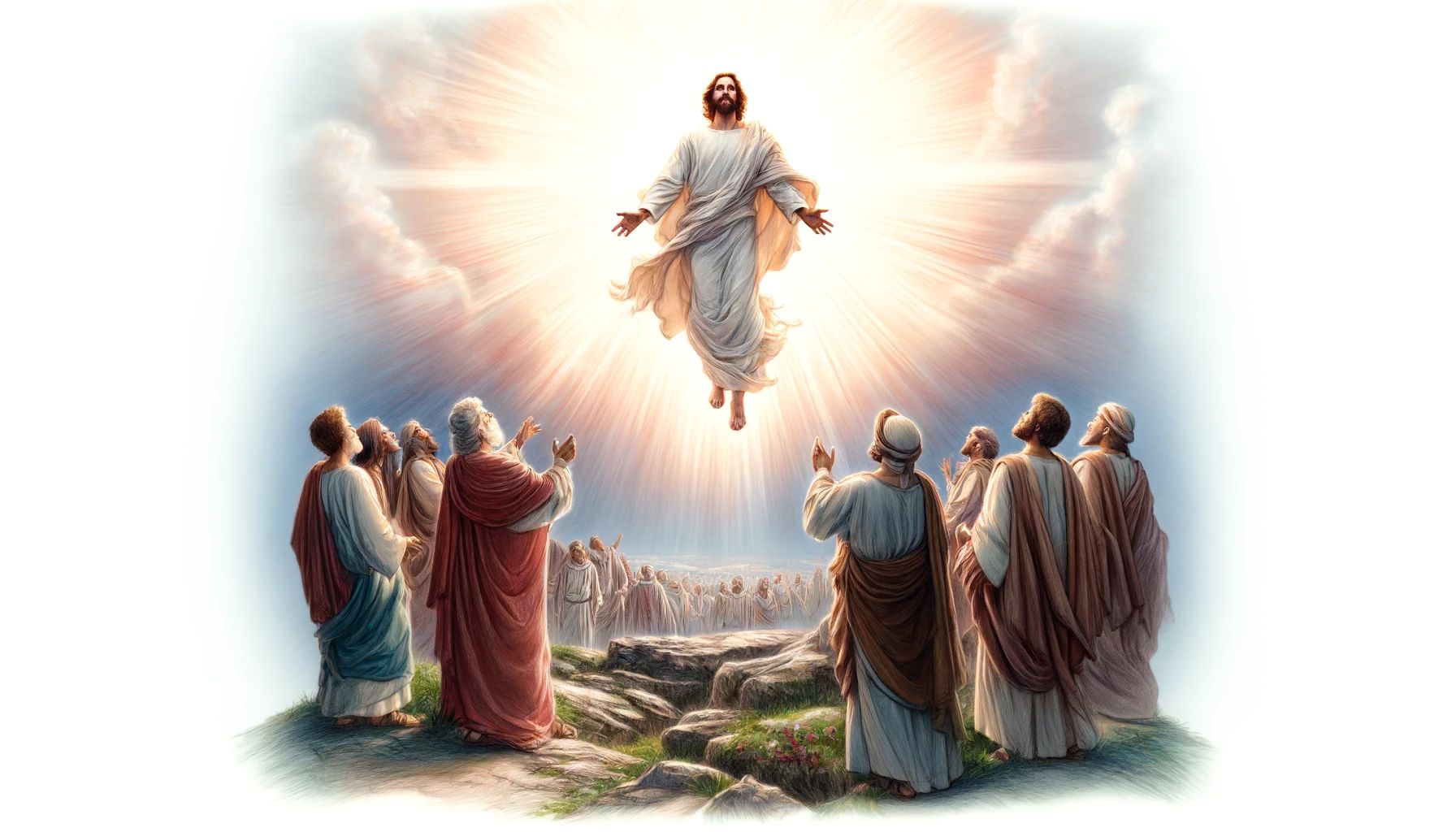
Jesus’ Ascension: Acts 1
The Ascension of Jesus, described in Acts 1:9-11, marks his return to heaven 40 days after his resurrection, witnessed by his apostles on the Mount of Olives near Jerusalem. This event signifies Jesus’ glorification and the promise of the Holy Spirit, highlighted by angels who foretell Jesus’ eventual return, anchoring it as a foundational moment of hope and doctrine in Christian faith. Here are some quick facts about Jesus’ Ascension as described in Acts 1:
- Event Location: The Ascension took place on the Mount of Olives, near Jerusalem.
- Timing: It occurred 40 days after Jesus’ resurrection.
- Witnesses: Jesus ascended into heaven in the presence of his apostles.
- Final Instructions: Before ascending, Jesus instructed his disciples to wait in Jerusalem for the Holy Spirit.
- Angelic Message: Two angels appeared to the disciples, telling them that Jesus would return in the same way they saw him ascend.
- Significance: The Ascension marked the end of Jesus’ earthly ministry and his enthronement as Lord and Christ.
- Scriptural Basis: This event is recorded in Acts 1:9-11.
“And when he had said these things, as they were looking on, he was lifted up, and a cloud took him out of their sight.”
Acts 1:9
The Ascension of Jesus Christ holds profound theological significance within Christian doctrine, encapsulating themes of authority, fulfillment, and eschatological hope. This event, as recorded in Acts 1:9-11, not only concludes Jesus’ earthly ministry but also sets the stage for the church’s mission empowered by the Holy Spirit. Here’s a detailed analysis of its theological implications:
Authority and Lordship
The Ascension signifies the enthronement of Jesus as Lord and King, marking his return to divine glory and authority at the right hand of God (Psalm 110:1; Ephesians 1:20-22). This act of being taken up into heaven symbolizes Jesus’ supreme authority over heaven and earth, a central tenet to Christian understanding of divine sovereignty and the fulfillment of messianic prophecies.
High Priestly Role
In the context of Hebrews 4:14-16, the Ascension is pivotal in establishing Jesus’ ongoing high priestly ministry in heaven. As the High Priest, Jesus enters the heavenly sanctuary not made with hands, offering not the blood of goats and calves but his own blood, thus securing eternal redemption for humanity (Hebrews 9:11-12). This intercessory role underscores a continuous relationship between the believer and the divine, facilitated by Jesus’ mediatory presence in heaven.
Fulfillment of Promise
The Ascension is integral to the fulfillment of Jesus’ promise of the Holy Spirit (John 16:7). By ascending, Jesus paves the way for the Spirit’s descent at Pentecost, empowering the apostles and the early church for global mission (Acts 1:8). This empowerment is crucial for understanding the church’s role in witnessing and spreading the Gospel, sustained by the Spirit’s guidance.
Eschatological Hope
The Ascension engenders eschatological hope, anchored in the angelic proclamation that Jesus will return “in the same way you have seen him go into heaven” (Acts 1:11). This promise of Jesus’ second coming forms a core aspect of Christian eschatology, offering believers hope for future vindication, restoration, and the consummation of God’s kingdom.
The Church’s Mission
Finally, the Ascension initiates the mission of the church. With Jesus’ physical departure, the focus shifts to the apostles and the early Christian community, now tasked with spreading the Gospel to all nations. The Ascension, therefore, not only marks the end of Jesus’ earthly ministry but also the beginning of the church’s global mission, energized by the promised Holy Spirit.
In theological discourse, the Ascension is not merely an event of historical or doctrinal significance but a multifaceted cornerstone that weaves together themes of divine authority, redemption, fulfillment of promise, and the hope of glory. It encapsulates the transition from Jesus’ earthly ministry to his heavenly ministry, setting the foundation for the church’s identity and mission in the world.
Tag:Apostolic Witness, Authority, Christian Eschatology, Church's Mission, divine sovereignty, Eschatological Hope, Eternal Redemption, Fulfillment of Promise, Global Mission, Gospel Spread, Heavenly Sanctuary, High Priestly Role, Holy Spirit, Lordship, messianic prophecies, Pentecost, Second Coming



